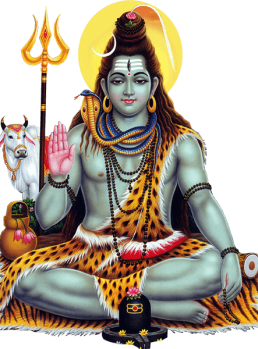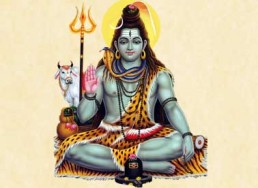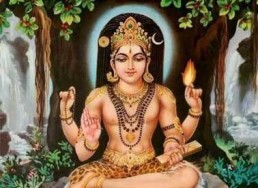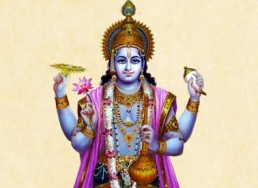Chandrashekhara Ashtakam
चन्द्रशेखर चन्द्रशेखर चन्द्रशेखर रक्ष माम् ॥ १॥
candraśekhara candraśekhara candraśekhara rakṣa mām .. 1..
Oh Chandrashekara (The Lord whose crown is the moon), please save me.
सिञ्जिनीकृत पन्नगेश्वरमच्युताननसायकम् ।
क्षिप्रदग्धपुरत्रयं त्रिदिवालयैरभिवन्दितं
चन्द्रशेखरमाश्रये मम किं करिष्यति वै यमः ॥ २॥
siñjinīkṛta pannageśvaram acyutānanasāyakam .
kṣipradagdhapuratrayaṃ tridivālayairabhivanditaṃ
candraśekharamāśraye mama kiṃ kariṣyati vai yamaḥ .. 2..
Who made head of the serpents (Vasuki) as his bowstring, who used Lord Vishnu as an arrow
The destroyer of three cities (Tripuras), the one bowed by all in the three worlds
I seek the refuge of that God Chandrasekhara (God Shiva, who has the moon on his head), so what can Yama do to me?
भाललोचन जातपावक दग्धमन्मथ विग्रहम् ।
भस्मदिग्धकलेवरं भवनाशनं भवमव्ययं
चन्द्रशेखरमाश्रये मम किं करिष्यति वै यमः ॥ ३॥
bhālalocana jātapāvaka dagdhamanmatha vigraham .
bhasmadigdhakalevaraṃ bhavanāśanaṃ bhavamavyayaṃ
candraśekharamāśraye mama kiṃ kariṣyati vai yamaḥ .. 3..
The one who burnt Manmada, Lord of Love, by the fire of his eye present on his forehead
Whose body is smeared with holy Ash or Bhasma, the destroyer of sorrows, who lives eternally
I seek the refuge of that God Chandrasekhara (God Shiva, who has the moon on his head), so what can Yama do to me?
पङ्कजासन पद्मलोचन पूजिताङ्घ्रि सरोरुहम् ।
देवसिन्धुतरङ्गसीकर सिक्तशुभ्रजटाधरं
चन्द्रशेखरमाश्रये मम किं करिष्यति वै यमः ॥ ४॥
paṅkajāsana padmalocana pūjitāṅghri saroruham .
devasindhutaraṅgasīkara siktaśubhrajaṭādharaṃ
candraśekharamāśraye mama kiṃ kariṣyati vai yamaḥ .. 4..
Whose lotus like feet are worshipped by Lord Brahma, who is usually seated on the lotus (Pankajasana), and Lord Vishnu, who is lotuseyed (Padma lochana)
Whose matted locks of hair are cleaned by the drops coming from the waves of Akasha Ganga
I seek the refuge of that God Chandrasekhara (God Shiva, who has the moon on his head), so what can Yama do to me?
शैलराजसुतापरिष्कृत चारुवामकलेवरम् ।
क्ष्वेडनीलगलं परश्वधधारिणं मृगधारिणं
चन्द्रशेखरमाश्रये मम किं करिष्यति वै यमः ॥ ५॥
śailarājasutāpariṣkṛta cāruvāmakalevaram .
kṣveḍanīlagalaṃ paraśvadhadhāriṇaṃ mṛgadhāriṇaṃ
candraśekharamāśraye mama kiṃ kariṣyati vai yamaḥ .. 5..
Who has the left part of his body decorated with the body of the daughter of Mountains, Devi Parvathi
One with a blue throat, whose hand is adorned with an axe as a weapon, who holds a deer in his hands
I seek the refuge of that God Chandrasekhara (God Shiva, who has the moon on his head), so what can Yama do to me?
नारदादि मुनीश्वरस्तुत वैभवं भुवनेश्वरम् ।
अन्धकान्धकामाश्रितामरपादपं शमनान्तकं
चन्द्रशेखरमाश्रये मम किं करिष्यति वै यमः ॥ ६॥
nāradādi munīśvarastuta vaibhavaṃ bhuvaneśvaram .
andhakāndhakāmāśrita amarapādapaṃ śamanāntakaṃ
candraśekharamāśraye mama kiṃ kariṣyati vai yamaḥ .. 6..
Whose greatness is praised by the Narada and other sages, the Lord of all the worlds
Who destroyed the pride of Andhaka, the wish fulling tree for the refugee
I seek the refuge of that God Chandrasekhara (God Shiva, who has the moon on his head), so what can Yama do to me?
दक्षयज्ञविनाशनं त्रिगुणात्मकं त्रिविलोचनम् ।
भुक्तिमुक्तिफलप्रदं सकलाघसङ्घनिबर्हणं
चन्द्रशेखरमाश्रये मम किं करिष्यति वै यमः ॥ ७॥
dakṣayajñavināśanaṃ triguṇātmakaṃ trivilocanam .
bhuktimuktiphalapradaṃ sakalāghasaṅghanibarhaṇaṃ
candraśekharamāśraye mama kiṃ kariṣyati vai yamaḥ .. 7..
The destroyer of Daksha yagna, A personified form of the three Gunas and the one with three eyes
The bestower of Devotion, Salvation, and other wishes, the destroyer of all the sins
I seek the refuge of that God Chandrasekhara (God Shiva, who has the moon on his head), so what can Yama do to me?
सर्वभूतपतिं परात्परमप्रमेयमनुत्तमम् ।
सोमवारिद भूहुताशन सोमपानिलखाकृतिं
चन्द्रशेखरमाश्रये मम किं करिष्यति वै यमः ॥ ८॥
sarvabhūtapatiṃ parātparam aprameyamanuttamam .
somavārida bhūhutāśana somapānilakhākṛtiṃ
candraśekharamāśraye mama kiṃ kariṣyati vai yamaḥ .. 8..
Who is the head of all the creatures, who is beyond all, who cannot be compared with anyone, who doesn’t have anyone greater than him
The one who is present as a form in the ones who drink Soma in a ritualistic way
I seek the refuge of that God Chandrasekhara (God Shiva, who has the moon on his head), so what can Yama do to me?
संहरन्तमपि प्रपञ्चमशेष लोकनिवासिनम् ।
क्रीडयन्त महर्निशं गणनाथयूथ समन्वितं
चन्द्रशेखरमाश्रये मम किं करिष्यति वै यमः ॥ ९॥
saṃharantamapi prapañcamaśeṣa lokanivāsinam .
krīḍayanta maharniśaṃ gaṇanāthayūtha samanvitaṃ
candraśekharamāśraye mama kiṃ kariṣyati vai yamaḥ .. 9..
Who destroys the universe at the appropriate time, who made the world a living place for innumerable counts of people
Who is playful all the days and nights, the head of the Ganas, and who acts as one among them
I seek the refuge of that God Chandrasekhara (God Shiva, who has the moon on his head), so what can Yama do to me?
यत्र कुत्र च यः पठेन्न हि तस्य मृत्युभयं भवेत् ।
पूर्णमायुर रोगितामखिलार्थसम्पदमादरं
चन्द्रशेखर एव तस्य ददाति मुक्तिमयत्नतः ॥ १०॥
yatra kutra ca yaḥ paṭhenna hi tasya mṛtyubhayaṃ bhavet .
pūrṇamāyura rogitām akhilārtha sampadamādaraṃ
candraśekhara eva tasya dadāti muktimayatnataḥ .. 10..

Description
The lyrics and meaning of Chandrasekhara Ashtakam have an in-depth explanation of the greatness of God shiva, his appearance, the protection offered to his devotees, along with the divine qualities of the Lord.
It was the hymn sung by Markandeya rishi and is related to his legend where he offered his prayers to God Shiva, in order to get away from the clutches of the Yama, the lord of death. During which, God Shiva offered his protection to Markandeya, defeating Yama to the point of death.
Chandrasekhar Ashtakam was written by Rishi Markandeya. One legend relates the story of how Lord Shiva protected Markandeya from the clutches of death, personified as Lord Yama.
Mrikandu rishi and his wife Marudmati worshipped Shiva and sought from him the boon of begetting a son. As a result, he was given the choice of either a righteous son, but with a short life on earth or 100 long-lived, foolish sons. Mrikandu rishi chose the former and was blessed with Markandeya, an exemplary son, destined to die at the age of 16.
Markandeya grew up to be a great devotee of Shiva and on the day of his destined death, he continued his worship of Shiva in his aniconic form of Shivalingam. The messengers of Yama, the god of death were unable to take away his life because of his great devotion and continual worship of Shiva. Yama then came in person to take away Markandeya’s life and sprung his noose around the young sage’s neck. By accident or fate the noose mistakenly landed around the Shivalingam, and out of it, Shiva emerged in all his fury attacking Yama for his act of aggression. After defeating Yama in a battle to the point of death, Shiva then revived him, under the condition that the devout youth would live forever. For this act, Shiva was thereafter also known as Kalantaka (“Ender of Death”).
The word Kalantaka means “He who ends Death”. The name is derived from two Sanskrit words- kala (काल) which means “Death or Time” and antaka (अन्तक) which means “He who ends”.
Sage Markandeya sang the Chandrasekhar Ashtakam in praise of Lord Shiva. Every single word in the song is absolutely profound and beautiful.
Other Shiva Shlokams
Aksharamalika Shiva Stotram
Also called the Shiva Akshara Mala Stotram, this is a very popular prayer addressed to Lord Shiva. Each verse starts in the order of alphabets in Sanskrit.
Anayasena Maranam
O Lord Shiva, please grant me a peaceful death without pain (Anasayena Maranam), a life without any trouble or dependence on others for my basic needs (Vina Dhainyena Jeevanam) and a life filled with
Ardha Narishvara Stotram
Shri Ardhanareeshwara Stotram was composed by Sri Adi Shankara bhagavatpada. Creator and Creation are One ~ Ardhanarishwara, composite of Shiva and Shakti together in one body.
Bhoothanath Ashtakam
The Bhoothanatha Ashtakam composed by Shri Krishnadasa is a devotional hymn that glorifies Lord Shiva in his form as Bhoothanatha, the Lord of all beings, spirits, and the cosmos.
Bilvashtakam
Composed by Sri Adi Shankaracharya, the famous Bilvashtakam extols the virtues of the Bilva leaf (also spelt Vilva, Bilwa) and Lord Shiva’s love for it. The following com
Bilvashtakam 14 Verses
Note: For the original version of Bilvashtakam please click here. Composed by Sri Adi Shankaracharya,
Dakshinamurthy Stotram
Shlokams,Sankara,Shiva,Dakshinamurthy
The Dakshinamurti Stotra is a Sanskrit religious hymn to Shiva by Sri Adi Shankaracharya. It explains the metaphysics of the universe in the frame of the tradition of Advaita V
Ishvaro Guru Atmeti
Shlokams,Shiva,Dakshinamurthy,Guru,Sankara
Salutations to Lord Dakshinamurti, who is all-pervasive like space but who appears (as though) divided as Lord, Guru, and the Self.
Kalabhairava Ashtakam
Composed by Sri Adi Shankaracharya. The hymn illustrates the personality of Kala Bhairava of Kashi, the God of Death(kala). Those who study these 8 verses on Kala Bhairava, which are enticing and whic
Karacharana Kritam
O Lord, kindly forgive all the wrong acts and omissions I have committed, whether I committed them knowingly or unknowingly, with my hands, feet, words, ears, eyes, or mind. Glory to you, Mahadeva, wh
Karpura Gauram
Pure white like camphor, an incarnation of compassion, the essence of worldly existence, whose garland is the king of serpents, always dwelling inside the lotus of the heart. I bow to Shiva and Shakti together
Kasi Viswanathashtakam
Composed by Sri Adi Sankaracharya in praise of Lord Shiva. That man who reads this octet with its meaning, which sings the praise of Shiva who is the lord of Varanasi, would get knowledge, wealth, gre
Lingashtakam
The Lingashtakam is one of the most popular Ashtakams(a Stotram with 8 verses) dedicated to Lord Shiva which praises Him in the abstract "Lingam" form.
Maha Shivaratri
Significance of Ganesh Puja, Vinayaka Chavithi or Chathurthi. See how to prepare for Ganesha Pooja, How to perform the Puja with Video instructions and enjoy Audio devotional songs, uninterrupted and without ads.
Mantra Pushpam
The Mantra Pushpam (literally translating to "Flower of Mantras") is a collection of sacred verses from the 10th chapter of Taittiriya Aranyaka of Krishna Yajur Veda. Each verse begins with an exploration of the relationship between the flower of…
Margabandhu Stotram
This great Stotra Rathna was written by Appayya Deekshitha(1520-1593). He was one of the great interpreter of Advaitha Sidhantha after Adi Sankara. This stotra is written in praise of the Lord Margaba
Mauna Vyakhya
Shlokams,Sankara,Shiva,Dakshinamurthy
I salute Sri Dakshinamurti, who is not subject to time, who makes known the truth of Brahman through the implied meaning of words, who is surrounded by disciples who are themselves Rishis and committe
Mruthyunjayaya Rudraya
Salutation to you Mrithyunjaya, Rudra, Nilakanta, Shambhu & the lord of immortals and this great lord of all beings.
Namaste astu bhagavan
Morning prayer. From Devi Mahatmyam. The Devi Mahatmyam is a Hindu religious text describing the Goddess as the supreme power and creator of the universe. It is part of the Markandeya Purana, and esti
Nidhaye Sarvavidyanam
Shlokams,Sankara,Shiva,Dakshinamurthy
Salutations to Sri Dakshinamurti, the reservoir of knowledge (the abode of all learning), the healer of all those who suffer from the disease of samsāra, and the teacher of the whole world.
Om Namah Pranavarthaya
Shlokams,Sankara,Shiva,Dakshinamurthy
Om. Salutation to the one who is the meaning of praņava, who is in the form of pure knowledge, who is taintless and who is free from any change. To that Sri Dakshinamurti, (my) salutations.
Om Namo Bhagavate Dakshinamurthaye
Shlokams,Sankara,Shiva,Dakshinamurthy
Om. Salutations to Bhagavan Dakshinamurti. (Oh Lord) Bless me with memory, the capacity to think properly, and clarity, wisdom.
Rudra Ashtakam
The famous Rudrashtakam extols the many qualities of Shiva. This is composed by Sri Goswami Tulsidas. Rudra is considered as the fearsome manifestation of Shiva. Rudrashtakam has its origins in the Ra
Rudram Chamakam
The Chamakam portion of the Sri Rudram is a profound and structured Vedic prayer that follows the Namakam, extending the worship of Lord Rudra (Shiva) by asking for blessings and the fulfillment of various needs. Unlike the Namakam, which focuses on…
Rudram Chamakam Meaning
The Chamakam portion of the Sri Rudram is a profound and structured Vedic prayer that follows the Namakam, extending the worship of Lord Rudra (Shiva) by asking for blessings and the fulfillment of various needs. Unlike the Namakam, which focuses on…
Rudram Laghunyasam
Laghunyasam is a preliminary Vedic chant traditionally recited before performing the Sri Rudram to purify and align the body, mind, and spirit with divine energy. The term "Nyasam" refers to a process of mentally assigning or dedicating various…
Rudram Laghunyasam Meaning
Laghunyasam is a preliminary Vedic chant traditionally recited before performing the Sri Rudram to purify and align the body, mind, and spirit with divine energy. The term "Nyasam" refers to a process of mentally assigning or dedicating various…
Rudram Namakam
The Namakam portion of the Sri Rudram, also known as the Rudra Prashna, is a profound and intricate Vedic hymn found in the Krishna Yajurveda, specifically within the Taittiriya Samhita (Book 4, Chapter 5). The term Namakam is derived from the…
Rudram Namakam Meaning
The Chamakam portion of the Sri Rudram is a profound and structured Vedic prayer that follows the Namakam, extending the worship of Lord Rudra (Shiva) by asking for blessings and the fulfillment of various needs. Unlike the Namakam, which focuses on…
Shambu Devam Sakalajagatam
I sing in praise of God Shambhu, the Lord of all worlds, and the three-eyed one; the consort of Gauri, the grantor of happiness, blessings and gifts, the one with the moon as his crest-jewel.
Shambu Stuti
A stuti on lord Shiva composed by lord Rama himself. Lord Rama recites this at Rameshwaram when faced with the near impossibility of crossing the vast ocean to reach Lanka, he prayed intensly to Lord
Shiva Aparadha Kshamapana Stotram
The Śiva Aparādha Kṣamāpaṇa Stotram, or "Hymn of Forgiveness for Offenses to Lord Śiva," is a heartfelt composition by the revered philosopher and saint Śrī Ādi Śaṅkarācārya. T
Shiva Ashtakam
Composed by Adi Shankaracharya. This ashtakam is a descriptive salutation of the different attributes of Shiva. The great yogi who is referred to as Ardhanarishwara (the one who has included the femin
Shiva Mahimna Stotram
The Shiva Mahimna Stotra is very popular among the devotees of Lord Shiva and is considered one of the best among all Stotras (or Stutis) offered to Lord Shiva. The legend abou
Shiva Mahimna Stotram Meaning
The Shiva Mahimna Stotra is very popular among the devotees of Lord Shiva and is considered one of the best among all Stotras (or Stutis) offered to Lord Shiva. The legend abou
Shiva Manasa Puja
Sri Adi Shankaracharya composed this mantra for lord Shiva. Using this stotra, we can perform mental worship of Lord Shiva.
Shiva Panchakshara Stotram
The famous Shiva Panchakshara Stotram praises Shiva and the power of the five sacred syllables, na-ma-shi-va-ya.
Shiva Pratah Smaranam
This is a short and beautiful 'Three Shloka Prayer' that makes the start of the day full of energy and happiness. Composed by Sri Adi Shankaracharya.
Shiva Sahasranama Stotram
Also called the Shiva Akshara Mala Stotram, this is a very popular prayer addressed to Lord Shiva. Each verse starts in the order of alphabets in Sanskrit.
Shiva Shadakshara Stotram
In this Hexa-Syllabic Hymn, there is a single stanza mantra for each letter of Aum-Na-Ma-Shi-Va-Ya. This mantra is found in Rudrayamala Tantra text.
Shiva Tandava Stotram
Shiva Tandava Stotram The Shiva Tandava Stotram is a deeply powerful and rhythmic hymn that glorifies Lord Shiva's cosmic dance, known as the Tāṇḍava. It is traditiona
Tatpurushaya Vidmahe Rudra Gayatri Mantra
Om. May we know that Lord Isvara, for which may we meditate upon Mahadeva. May that Rudra impel us (towards him).
Tryambakam Yajamahe
We worship Lord Shiva the three-eyed one, the one who is the master of all senses and qualities and the one who is the sustainer of all growth. May he release us from the bondage of death, just as a r
Vagarthaviva Sampruktau
Kalidasa prays to the divine parents Paarvathi & Parameshwara who are inseparable like the word and its meaning, in order to guide him in acquiring the power of words and their meanings (literature) as he embarks on the Mahakavya, Raghuvamsa.
Vande Shambu Umapatim
I salute Shambu, Umapati, the preceptor (teacher) of devas, I salute the cause of the earth, I salute the one ornamented with the serpent, the wearer of the moon, I respect that master of all beings.
Vedasara Shiva Stava
Composed by Sri Adi Shankaracharya in praise of Lord Shiva - the essence of vedas.
Chandrashekhara Ashtakam – Shiva – Lyrics In Sanskrit, English with Translation, Meaning, Audio and Significance



